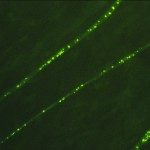Link to Pubmed [PMID] – 15033799
Ann. N. Y. Acad. Sci. 2003 Dec;1010:598-603
We report that non-neurotropic rabies virus (RV) strains, currently used to immunize wildlife against rabies, induces not only a caspase-dependent apoptosis in the human lymphoblastoid Jurkat T cell line (Jurkat-vect), but also a caspase-independent pathway. Cell redistribution of the apoptosis-inducing factor (AIF) was observed in Jurkat-vect infected with RV vaccine strain. Bcl-2 overproduction in Jurkat T cells (Jurkat-Bcl-2) abolished both caspase activation and AIF distribution. In contrast, strain of neurotropic RV did not induce apoptosis. The inverse correlation of the induction of apoptosis and the capacity of a virus strain to invade the brain suggests that blockage of apoptosis could be a strategy selected by neurotropic virus to favor its progression through the nervous system.

